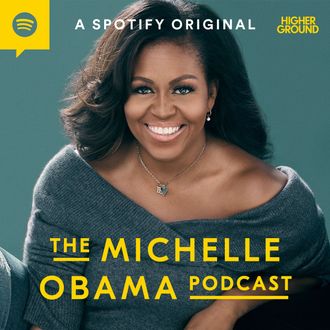
“Will Michelle Obama ever run for office?”
That’s a question that tends to roll around certain liberal circles with some persistence, and I suppose the sentiment is perfectly understandable. After all, the former First Lady remains one of the most popular public figures in the world. It could happen.
But whether Michelle Obama has aspirations for elected office seems beside the point, at least for now. For one, becoming an elected official requires significant compromise to Obama’s current symbolic power. What Michelle Obama actually is at this moment — an extremely popular, engaged, and active semi-political media figure — outranks a whole lot of other positions when it comes to her actual impact on society.
Which brings us to The Michelle Obama Podcast. Following shortly in the wake of Obama’s Netflix documentary Becoming, itself a kind of adaptation of her best-selling memoir, the podcast echoes those previous efforts in form and function. These projects collectively serve as a platform for Obama to channel her beliefs, worldview, and experiences on her own terms. They refract her outward as the full, complex human being that she is: an idealist, a Black woman with power, a consummate professional, a mother, a wife, a daughter, a person with stakes in the world, and, of course, the former First Lady. This, in and of itself, already renders the podcast as a remarkable political achievement, an artifact whose very existence pushes back against regressive forces that seek to reduce, dehumanize, or caricature people just like her.
The Michelle Obama Podcast is a complicated thing to write about, due to its dual nature of being both an entertainment product and a tool of political communication, even if the communicator herself isn’t a formal politician. Let’s start with entertainment value: It should be noted that the show is plenty fun to listen to, at least based on the first two episodes I checked out to write this piece. The conversations — the first with Barack Obama, the second with former All Things Considered host Michele Norris — are fun and lively, in a way that can feel unexpected for somebody with that much celebrity.
More crucially, they are effortlessly fluid in balancing the personal and the political, in the way that the very best orators and interlocutors are. Put simply, this is political communication at the highest level, to a point where it would be entirely inappropriate to compare this production with other podcasts from political figures, which tend to be poorly made and flagrantly utilitarian. (On a related note, did you know that Joe Biden has a podcast? Or Ted Cruz? Or Bernie Sanders, at least up until his campaign ended?)
For the politically aligned, much of the show’s pleasures lie in its provision of simple moral leadership at a time when such a thing feels completely absent. Biden, the presumed Democratic presidential candidate, has largely stuck to a campaign strategy defined by negative space, which might be effective as an anti-Trump electoral measure but nonetheless leaves the rest of us with little to latch onto. Meanwhile, the Democratic Party seems fundamentally unable to latch onto any moment with any significance, and almost everybody on the other side of the aisle comes off as basically being chaos manifest, seemingly unmoved or insufficiently affected by the notion of calamitous human loss.
Part of a public leader’s role involves building a shared narrative for the masses to viscerally participate in. Those woven narratives help us make sense of what we’re experiencing, locating it in relation to the world and each other. That’s the work being done in this show, and Obama’s approach to the role is grounded in the idea that she isn’t apart from the masses but that she is a part of the masses, stuck down here in the dirt with the rest of us. She’s not immune from suffering depression within the context of a global pandemic; she’s juggling her own lulls in staying motivated while trying to get things done.
This is, of course, a partly illusory positioning, given that the Obamas are, definitionally, not really the masses, and they are in fact quite wealthy, quite powerful, and quite protected. They are also located within a specific type of politics. Make no bones about it: The podcast is an extension of a particular worldview. There’s the basic stuff, like volleying critiques of the current administration, though the president is never mentioned by name. But there’s also the stuff that goes in the other direction. “Revolution rarely works,” Obama says at one point in the second episode, an assertion that runs up against certain wings of the political left. “History has shown us that that’s not the best bet. The best bet is a democracy with active, engaged citizens and leaders who are accountable.”
All of which is to say, The Michelle Obama Podcast might be a complicated thing to experience for anyone who doesn’t sit cleanly within its worldview or coalition. I, for one, am deeply moved and taken by its comforts, so parched am I for any modicum of moral leadership in the public sphere. Yet I’m also wary of the potential traps of being too taken or swayed, familiar with the failure of incremental politics and skeptical of the celebrity-political-media-industrial complex that governs the context of the show, so grounded in the very capitalism Obama occasionally critiques in her conversations, which tends to favor performances of moral leadership over the blood and sweat of those whose boots remain on the ground.
Then again, the pursuit of political purity is a fool’s errand in a complex world, and where I sit, there should be enough room to value The Michelle Obama Podcast for what it is and what it gives, while keeping the full width of its politics at arm’s length.


